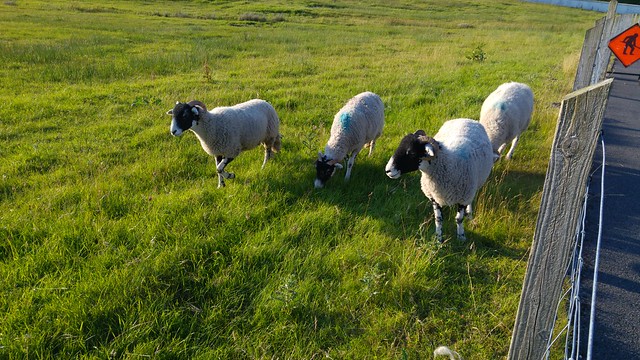Words for sheep and related words in Celtic languages.
| Proto-Celtic | *kaɸrāxs = sheep |
|---|---|
| Old Irish (Goídelc) | cáera, caíra [ˈkaːi̯ra] = ox, cow |
| Irish (Gaeilge) | caora [ˈkeːɾˠə / ˈkiːɾˠə] = sheep, ewe |
| Scottish Gaelic (Gàidhlig) | caora [kɯːrə] = sheep, sheepish person |
| Manx (Gaelg) | keyrrey = sheep |
| Middle Welsh (Kymraec) | kaeriwrch = roebuck |
| Welsh (Cymraeg) | caer = sheep (archaic) caeriwrch / cariwrch = roebuck |
Etymology: possibly from the Proto-Indo-European *kápros (goat) [source].
| Proto-Celtic | *damos = ox, bull, domesticated animal *dametos = sheep |
|---|---|
| Old Irish (Goídelc) | dam [daṽ] = ox, stag, hero, champion |
| Irish (Gaeilge) | damh [d̪ˠaw] = ox, stag; strong man, champion, corpulent person damh alla = stag damh comhair = one of a pair of oxen, yokefellow; equal, peer damháire = bellowing, lowing (of oxen), belling (of stag) damhán = small ox damhra = oxen, yoke of oxen; stags, herd of deer |
| Scottish Gaelic (Gàidhlig) | damh [dav] = stag (antlered, up to 4 yrs old), ox, oaf, crab missing a claw damh-féidh = hart, stag cho dall ri damh ann an ceò = as blind as a bat in daylight (“as blind as an ox in the fog”) |
| Manx (Gaelg) | dow = ox, hart, stag |
| Proto-Brythonic | *daβ̃ad = sheep |
| Middle Welsh (Kymraec) | dauat, davad = sheep |
| Welsh (Cymraeg) | dafad [ˈdavad/ˈdaːvad] = sheep, ewe; one who is under the charge of a spiritual pastor defaid cymorth = sheep given to a needy person to form the nucleus of a flock dafad ddu = black sheep, prodigal son, ne’er do-well of a family defaid Dafydd Jos = waves, billows (“David Jones’ sheep”) mynd yn draed defaid = to go to ruin (“to become sheep’s feet”) |
| Old Cornish | dauat = sheep |
| Cornish (Kernewek) | davas = ewe, sheep kig davas = mutton |
| Breton (Brezhoneg) | dañvad [ˈdãː.vat] = sheep; overly kind, gentle person; cuckold, flock; small, fluffy clouds, foamy waves dañvadez = ewe |
Etymology: the Brythonic words come from *dametos, which comes from *damos. Both these words come from the Proto-Indo-European *demh₂- (to domesticate, tame) [source]. The English words tame, (in)domitable and danger come from the same PIE root [source].
| Proto-Celtic | *retio- = ram |
|---|---|
| Old Irish (Goídelc) | reithe [r͈ʲeθʲe] = ram; boats used as fireships |
| Irish (Gaeilge) | reithe = ram |
| Scottish Gaelic (Gàidhlig) | reithe [r͈ʲe.ə] = ram, tup; Aries |
| Manx (Gaelg) | rea = ram, tup |
Etymology: unknown [source].
| Middle Welsh (Kymraec) | hwrd, hwrt = ram |
|---|---|
| Welsh (Cymraeg) | hwrdd = ram; a stupid person; battering ram; rammer, beater; Aries |
| Old Cornish | horþ = ram |
| Middle Cornish | hordh = ram |
| Cornish (Kernewek) | hordh = ram |
| Breton (Brezhoneg) | (h)ourz = ram |
Etymology: unknown.
| Proto-Celtic | *moltos = ram, wether (castrated ram) |
|---|---|
| Gaulish | *multon = sheep |
| Old Irish (Goídelc) | molt [mol͈t] = ram, wether |
| Irish (Gaeilge) | molt = wether, sulky, morose person |
| Scottish Gaelic (Gàidhlig) | molt [mul̪ˠt̪ˠ] = wether |
| Manx (Gaelg) | mohlt = castrated sheep, wether, mutton |
| Middle Welsh (Kymraec) | mollt = castrated ram, wether, mutton |
| Welsh (Cymraeg) | mollt [moːɬd / mɔɬt] = castrated ram, wether, mutton |
| Cornish (Kernewek) | mols = wether, sheep |
| Middle Breton | mout, maout = ram |
| Breton (Brezhoneg) | maout [ˈmɔwt] = ram, mutton; champion, trophy |
Etymology: uncertain, possibly from the Proto-Indo-European *(h₂)moldus (soft, weak) [source].
The Gaulish *multon is the root of the French word mouton (sheep, mutton), via the Vulgar Latin moltō (wether), and also of the Galician word motóa (sheep), and the English word mutton [source].
| Proto-Celtic | *ognos = lamb |
|---|---|
| Old Irish (Goídelc) | úan [uːa̯n] = lamb |
| Irish (Gaeilge) | uan = lamb |
| Scottish Gaelic (Gàidhlig) | uan [uən] = lamb |
| Manx (Gaelg) | eayn = lamb |
| Brythonic | *oɨn = lamb |
| Welsh (Cymraeg) | oen [oːɨ̯n / ɔi̯n] = lamb |
| Old Cornish | oin = lamb |
| Cornish (Kernewek) | oen = lamb |
| Breton (Brezhoneg) | oan = lamb |
Etymology: from the Proto-Indo-European *h₂egʷnós (lamb) [source].
Words marked with a * are reconstructions.
Sources: Wiktionary, Am Faclair Beag, MacBain’s Dictionary, teanglann.ie, On-Line Manx Dictionary, Geiriadur Prifysgol Cymru, Gerlyver Kernewek, Dictionnaire Favereau

Why does dafaid sound like David, who was a shepherd? Is there a connection in the dim and distant past?
There doesn’t appear to be any connection between dafad (sheep) in Welsh and the name David, which comes from Middle English David, Davyd, Davyde, from Old English Dauid, David, from Latin David, Davidus, from Koine Greek Δαυίδ (Dauíd), Δαβίδ (Dabíd), from Biblical Hebrew דּוד (Dāwîḏ, uncle, or literally “beloved”), from Proto-West Semitic *dād- (“paternal uncle”) [source].